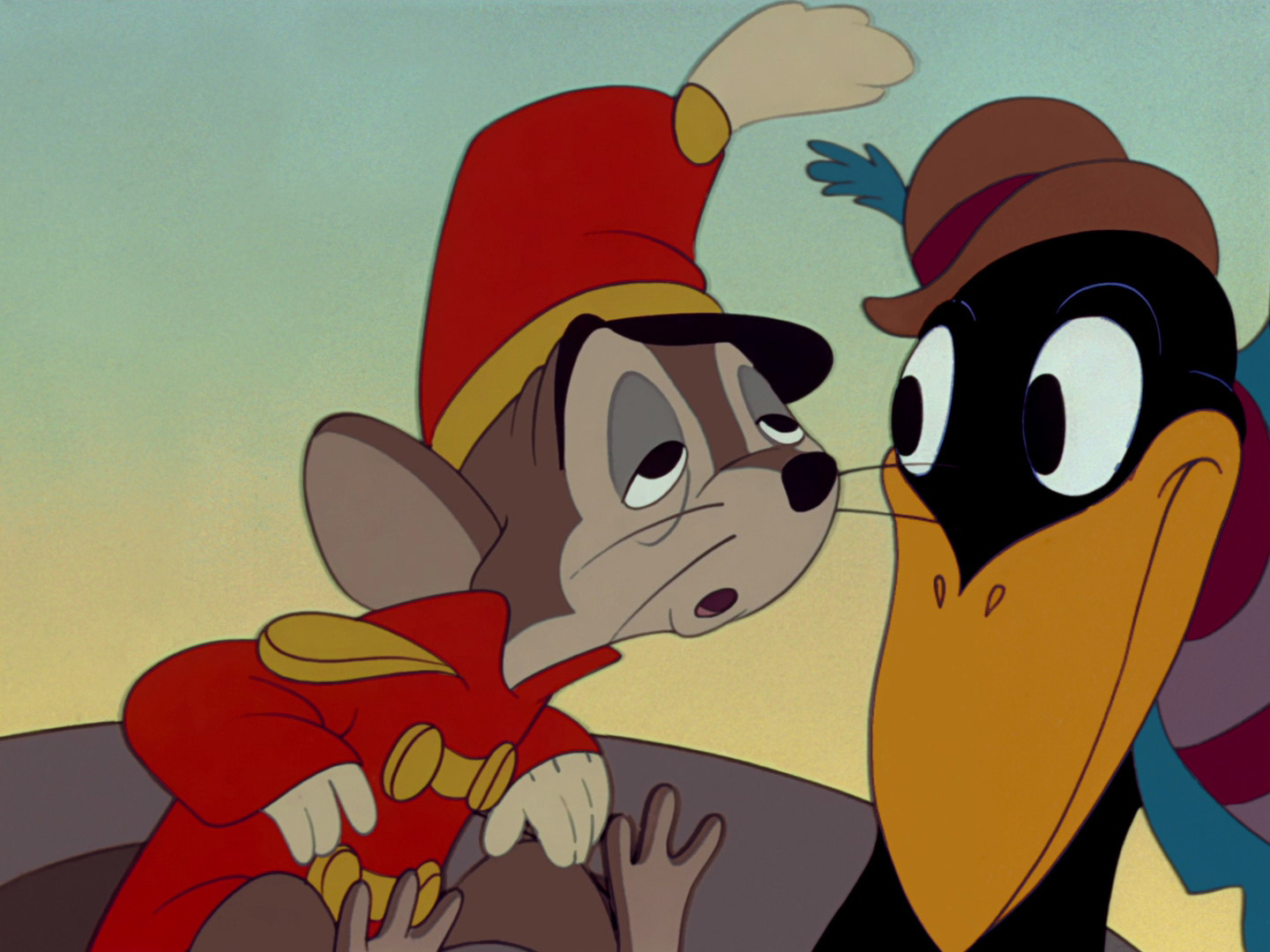The story of Dumbo (1941) is one of those classic films that most children do not go without seeing at an early age. At the time Disney was having financial troubles. Although Fantasia (1940) and Pinocchio (1940) were critically acclaimed, both failed to bring in a profit for the animation giant. Interestingly enough the screening of Dumbo (1941) did the exact opposite and even managed to be made during an animators' strike during the current time. Like a lot of the other Disney films, the iconic elephant would become apart of the library of assorted characters to represent the Disney company. The only thing that sets Dumbo apart from other Disney mascots is just how many people and fans remember him more than others. He probably comes 2nd or 3rd to Mickey. For this to stick that much there must have been something in the film to make it hang around so long in the conscious of the viewers.
 |
| Mother & Son <3 |
That something is what goes into this story's writing penned by Joe Grant and Dick Huemer. The story is about a newborn elephant with ears larger than normal being brought into the world by mother elephant Mrs. Jumbo. Yet with his ears being abnormally big, the name Dumbo ends up being his new name by the local snot nosed gossip circus elephants. Upon one show, locals begin to make fun of Dumbo, which enrages mom causing her to be separated from him. Feeling sad and alone, Dumbo befriends Timothy Q. Mouse (Edward Brophy) who sympathizes and wants to help him. There are two main components that work in the script. The first is the mother/son relationship between Dumbo and his mother. The other part is the life lesson of never stop believing in oneself and to never let others bring you down. Dumbo in some ways parallels that to an early version of WALL·E (2008); where the main character does not have much or if any dialog. This kind of writing isn't always effective because it's harder to portray emotions on a verbal level but that's not a problem here.
Dumbo is one the sweetest little characters a viewer could watch. There is literally nothing to dislike about him. He’s possibly even more innocent than Bambi (1942). Watching him interact with his mother is one of the sweetest moments in childhood history. It is this element that demonstrates how important a mother is in a child's life. As for Timothy Q. Mouse, he represents the self-preservation part about moving forward in life and not letting anyone stop you. If it were not for Timothy, who knows how long it would've taken Dumbo to get out of his slump of being mocked. Timothy is actually an underrated mouse icon and should be the second mouse to think of other than Mickey. However, even with these strong points there are some moments of question as to why they were even considered to be included. For these scenes, they involve the pink elephant sequence and racial representation.
During a moment when Dumbo has the hiccups he accidentally takes a drink out of bucket that contains booze and gets loopy, which then induces him and the audience into a trippy sequence about pink elephants. From a particular viewpoint the scene does make sense, which is distracting us so we're thrown off guard when the scene ends, but from another point of view there really is no other significance. It's just a scene that gets a bit weird over time and may give some kids nightmares. As for racial representation Dumbo and Timothy meet a group of crows that are drawn and talk like African Americans at the time (as media had thought). For both situations it's understood that more adults viewed cartoons at the time and the way African Americans were portrayed in cartoons was much different, but both don't excuse for how that turns out now. Yes, it is all apart of history but it is still insensitive. Children nowadays watch this and could get the wrong idea. If these parts were managed in a less insulting way there'd be more to give slack on.
 |
| Tim & Jim |
For this movie there was no head of production. There were seven different directors for this feature; all of which handled different sequences. Nonetheless they all are directed as if it were one person. The animation headed by Art Babbitt was well crafted too. All the movement on each character and objects were fluid and smooth. For a Disney film like this, nothing but excellence is expected, otherwise it would not be considered among the memorable films. The music composed by Oliver Wallace and Frank Churchill was an addition to happily hear. There are several tracks that are recognizable and are catchy to listen to. The main theme for Dumbo is heroic and brave sounding with that classic mid 1900s sound of horn and string. Other tracks like the odd "Pink Elephants" and jumpy Casey Jr. train tune are catchy and memorable too. It's not perfect but it is still an enjoyable piece of film work.
Unfortunately due to the time of its release, the film suffers from racial caricatures and adult content involving booze. It's not a huge anchor but it does feel insensitive. Thankfully the adorable main characters, effective writing, creative animation and memorable music help even things out.
Points Earned --> 7:10


No comments:
Post a Comment